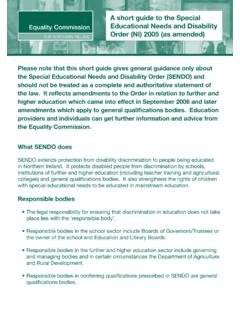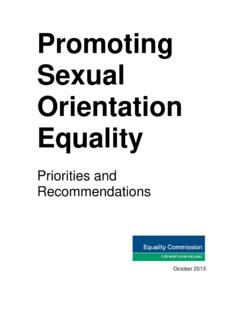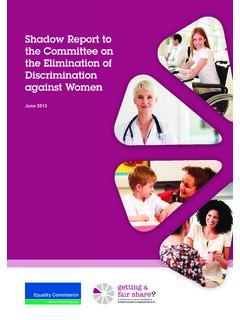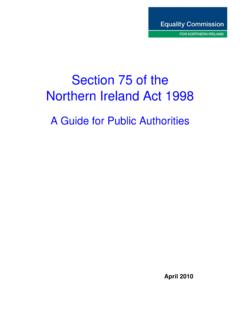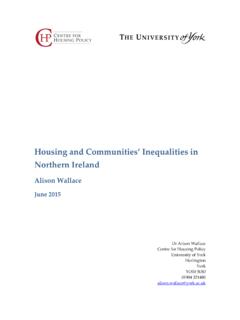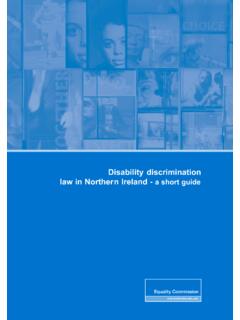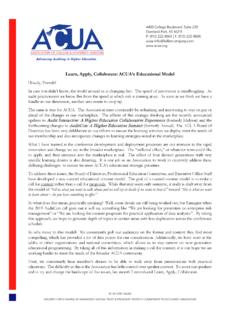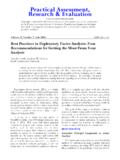Transcription of A short guide to the Special Educational Needs and ...
1 A short guide to the Special Educational Needs and disability Order (NI) 2005 (as amended). Please note that this short guide gives general guidance only about the Special Educational Needs and disability Order (SENDO) and should not be treated as a complete and authoritative statement of the law. It reflects amendments to the Order in relation to further and higher education which came into effect in September 2006 and later amendments which apply to general qualifications bodies. Education providers and individuals can get further information and advice from the Equality Commission. What SENDO does SENDO extends protection from disability discrimination to people being educated in Northern Ireland. It protects disabled people from discrimination by schools, institutions of further and higher education (including teacher training and agricultural colleges) and general qualifications bodies.
2 It also strengthens the rights of children with Special Educational Needs to be educated in mainstream education. Responsible bodies The legal responsibility for ensuring that discrimination in education does not take place lies with the responsible body'. Responsible bodies in the school sector include Boards of Governors/Trustees or the owner of the school and Education and Library Boards. Responsible bodies in the further and higher education sector include governing and managing bodies and in certain circumstances the Department of Agriculture and Rural Development. Responsible bodies in conferring qualifications prescribed in SENDO are general qualifications bodies. disability discrimination under SENDO. SENDO places duties on bodies responsible for the provision of education and associated services, admissions and expulsions, and the conferring of qualifications.
3 The duties can be summarised as follows: Not to directly discriminate against a person because of their disability . Not to treat disabled people less favourably (for a reason relating to their disability ) than it treats, or would treat, a person to whom that reason does not or would not apply (unless justified). This duty applies to institutions of further and higher education in relation to potential, present and former students, and to general qualifications bodies in relation to people who hold or apply for a relevant qualification conferred by the body. To make reasonable adjustments' to all policies, procedures and practices to ensure that a disabled person is not placed at a substantial disadvantage compared to those who are not disabled. This duty applies to institutions of further and higher education in relation to potential, present and former students, and to general qualifications bodies in relation to people who hold or apply for a relevant qualification conferred by the body.
4 This duty is both an anticipatory duty and a reactive duty. This means that Educational institutions must make changes, where reasonable, not only in response to the individual Needs of students but also proactively for disabled students generally. For colleges and universities, the reasonable adjustment duty applies also to the provision of auxiliary aids and services and to the physical environment. For general qualifications bodies, it applies to the physical environment of premises owned or leased by them. For schools, there is a duty to work towards making the education experience more accessible to disabled pupils and prospective pupils in terms of premises, the curriculum and information. For further guidance on this, please contact the Department of Education or the relevant Education & Library Board. For schools, the provision of auxiliary aids and services for disabled pupils and prospective pupils is facilitated through the Special Educational Needs framework.
5 SENDO does not provide a new or additional means of obtaining the necessary aids and services required to make education accessible to disabled pupils/. prospective pupils. 2. General qualifications bodies have a duty to take reasonable steps to prevent a provision, criterion or practice (other than a competence standard) placing a disabled person at a substantial disadvantage in comparison with people who are not disabled. It is always a reasonable step to grant an exemption from one or more components (other than a competence standard) of an examination or assessment where that is the only reasonable step that could be taken. In such cases, it is always a reasonable step for the general qualifications body to assess the candidate only in relation to those components for which an exemption has not been granted as if they comprised the entire examination or assessment.
6 Responsible bodies must not harass a disabled person by engaging in unwanted conduct which has the purpose or effect of violating the person's dignity, or of creating an intimidating, humiliating or offensive environment for that person. This applies to prospective, present and former students in relation to institutions of further and higher education, and to people who hold or apply for qualifications in relation to general qualifications bodies. For further information please contact the Equality Commission. Responsible bodies for schools, institutions of further or higher education and general qualifications bodies must not victimise a disabled person. Victimisation is a particular form of discrimination. In certain circumstances a person can claim that they have been victimised even though they are not a disabled person (for further information please contact the Equality Commission).
7 Definition of a disabled pupil/student or prospective pupil/student To have protection from disability discrimination under SENDO, an individual must meet the definition of being disabled. A person is regarded as being disabled for the purposes of SENDO if he/she has a physical or mental impairment which has a substantial and long term adverse effect on his/her ability to carry out normal day to day activities'. This is the same definition as that used in the disability Discrimination Act 1995. This definition may include people with a wide range of physical and learning disabilities, mental health or medical conditions (including cerebral palsy, asthma, diabetes, epilepsy, muscular dystrophy, autism, depression and ME, although this list is neither definitive nor exhaustive). For more guidance on what is defined as a disability , please contact the Equality Commission.
8 3. Resolving disputes If you feel that you or your child has been or is being discriminated against because of a disability there are a number of ways to resolve the situation. Concerns about disability discrimination can often be resolved informally through the school/college/university/general qualifications body's internal complaints system. As legal time limits apply even if informal methods of attempting to resolve a dispute are used, it is very important to seek advice immediately from the Equality Commission about what to do if you or your child feels discriminated against. Where both parties are agreeable, the Equality Commission can refer a dispute for independent conciliation. This is a way of resolving disputes that helps those involved to reach agreement with the help of an impartial third party the conciliator. It is essential that you seek advice from the Equality Commission immediately a dispute arises so that the options for finding a solution can be explored.
9 A legal complaint can be lodged with one of three places, depending on the nature of your complaint and the organisation you are complaining about. Your complaint could be dealt with by: a tribunal called the Special Educational Needs and disability Tribunal (SENDIST). (complaints against schools). an Expulsions Appeal Tribunal (complaints about expulsions from schools). the County Court (complaints against colleges, universities or general qualifications bodies). It is essential that you seek advice immediately as there are strict time limits within which you must act. If you don't act within the time limits, you or your child may lose the right to take a legal case. Role of the Equality Commission Under SENDO, the Equality Commission has responsibilities to promote good practice, produce codes of practice and guidance materials, give advice and consider assisting with complaints about disability discrimination in education.
10 The Equality Commission has produced two codes of practice one concerned with the schools sector and one relating to colleges and universities. Codes of practice aim to give practical guidance on how to provide an inclusive and accessible education to disabled people of all ages. They describe the duties on bodies responsible for the provision of education and other related services, and outline 4. the rights of disabled pupils/students and prospective pupils/students. Copies of the Codes and other guidance materials, including guidance relating to disability discrimination by general qualifications bodies are available from the Commission (details below) and on our website Special Educational Needs framework SENDO changed aspects of the Special Educational Needs process. Information on this can be found in the Department of Education's Supplementary Guidance to the Code of Practice on the Identification and Assessment of Special Educational Needs '.
